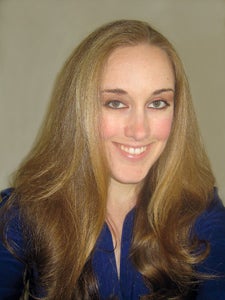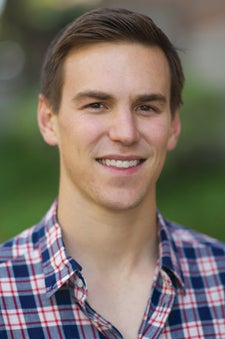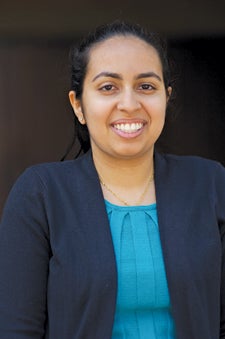All-Star Students
Genevieve Hoffman: Woman of International Mastery
Condi Rice, look out. Here comes Genevieve P. Hoffman.
The Class of 2012 valedictorian has what it takes to make tidal waves in Washington, D.C., according to faculty mentor Wayne Glass.
Glass ought to know. Besides being a Beltway insider with 26 years of top-level policy experience, he was diplomat Condoleezza Rice’s graduate school classmate in the late 1970s at the University of Denver.
“I gotta be honest with you,” said Glass, now a professor of international relations in USC Dornsife. “I think Genevieve has at least as much ability as Condi did in graduate school. I don’t want to go out there and say that she’ll be the secretary of state, but I’m telling you: They are in the same league.”
A double major in international relations and economics in USC Dornsife, with concentrations in security studies and international political economy, Hoffman has superstar qualities that don’t immediately smack you in the face. Glass remembered his first impression: a reserved young woman who “didn’t go on the offensive, kind of kept to herself a little.”

The Class of 2012 valedictorian Genevieve Hoffman, a double major in international relations and economics, completed the Thematic Options (TO) honors program and volunteered in local high schools with the Teaching International Relations Program (TIRP) based in USC Dornsife.
“My classes are filled with simulations and highly interactive exercises,” said Glass, who teaches courses on American foreign policy since 1945 and contemporary international politics. “It’s not unusual for the more aggressive students to jump up and move to the front of the room. Genevieve didn’t really do that. I wasn’t quite sure what to make of her.”
But the first time Hoffman got up to speak, Glass’ jaw dropped. “She’s just … wow!” he said. “I was completely astonished by how confident, how impressive she was. She delivered her well-formulated statements with maturity and a professional aplomb. She was clearly more advanced than any of her classmates. It really was a remarkable epiphany to me. As soon as she did it once, I knew that Genevieve was an all-star.”
Hoffman grew up in the San Francisco Bay area-suburb of Pleasanton, Calif., where she attended public school. Both her parents are certified public accountants: Her father retired a few years ago as a partner in the accounting firm KPMG; her mother stayed home to raise two children.
“Not very exciting, my upbringing,” she said wryly, during a telephone interview from Pleasanton. Hoffman moved back home in December, having finished her degree summa cum laude in just three-and-a-half years.
She leaves USC with a 3.98 GPA. Along the way, she completed the Thematic Options (TO) honors program, was elected to Phi Beta Kappa in her junior year and published a scholarly journal article on military commissions in the winter 2011 issue of Washington Undergraduate Law Review.
Between the demands of completing two majors in less than four years, she found time to tutor football players in economics for 12 to 15 hours a weekthrough USC’s Student-Athlete Academic Services. She volunteered in the Teaching International Relations Program, which introduces foreign policy curricula to high school classrooms in USC’s neighborhoods. She served on a TO Student Committee to help enhance the life of the honors community. And during one spring break, she traveled to Copenhagen, Denmark, and Stockholm with the USC Marshall School of Business’ International Experiential Corporate Environment Learning program to observe foreign business practices in action.
An avid photographer and musician, she made time to take a couple of piano courses at the USC Thornton School of Music – “just to refresh my music theory skills,” explained Hoffman, who sang in her high school chamber choir for three years. “I’m mostly self-taught in piano, so I might have missed out on basic fundamentals.”
Asked what she does in her spare time, Hoffman responded: “Nothing terribly exciting. I like to bake cookies, brownies — all kinds of things that I then pawn off on everyone I know, so that I don’t eat them! I love to go to the movies. I like to hang out with friends and gab about everything or nothing. I love to shop.”
Lately her shopping has focused on furnishings for her new apartment in Charlottesville, Va. Come September, Hoffman will be starting law school at the University of Virginia – the school founded by Thomas Jefferson.
“I’m a huge geek,” she said, “so I find that really exciting.”
Hoffman has known since she was a child that she would go to law school.
“I just grew up very interested in government, politics and history,” she said.
Her precise career path isn’t clear yet, but she suspects she’ll end up working in Washington, “somehow involved in government, politics or policymaking – and law is very much a part of that, since policy is made in the context of law.”
She has a head start. Hoffman spent the last three summers working as a legal intern for two attorneys in Pleasanton.
Since graduating early, Hoffman hasn’t slowed down a bit. She is taking a couple of courses at the local community college in business law and international business – “just for the hell of it,” she said. She has a part-time job in the women’s shoe department at Macy’s. “It wasn’t exactly my first choice,” she said with a chuckle, “but the mall is 12 minutes from my house, and I needed something that’s flexible and close by. It’s been an interesting exercise in customer service, sharpening my people skills.”
And lately, she’s been fine-tuning her valedictory speech — to be delivered on May 11 before an anticipated crowd of 40,000 people.
“I’m so thrilled for Genevieve, I can hardly stand it,” said Glass, thinking about that once-in-a-lifetime honor. “Couldn’t happen to a more qualified and deserving young lady.”
Ryan Hill: Hoops and Dreams
Ryan Hill got down into his defensive stance, the opposing guard made his move to the basket and their knees collided with a crack. Then a sophomore on the Dana Hills High School varsity basketball team in Dana Point, Calif., Hill felt his kneecap briefly pop out of place.
That summer, Hill underwent surgery to stabilize the kneecap. Not only did the procedure fix his knee, allowing him to continue playing basketball throughout high school, but it also helped him to identify a career path.
Hill, who is graduating as a salutatorian from USC Dornsife with bachelor’s degrees in kinesiology and biological sciences, knew then that he wanted to be a surgeon.
“I was always interested in science. As a kid, I remember I had this book that I loved that showed a cross section of a snail and a submarine,” Hill said. “And I always felt a gravitation toward helping people.

Ryan Hill, one of this year’s salutatorians, is graduating with bachelor’s degrees in kinesiology and biological sciences from USC Dornsife. Photo by Dietmar Quistorf.
“The injury wasn’t my turning point of wanting to go into medicine, but it got me interested in surgery and more specifically orthopaedic surgery,” he said. “I was able to shadow the doctor who performed the surgery on me … and I came into college much more sure that medicine was what I wanted to do.”
With a direction set, Hill went through the rigorous Baccalaureate/M.D. program that guarantees admission into the Keck School of Medicine of USC. He’s also on the waitlist for the medical schools at Columbia University, Vanderbilt University and the University of Chicago. He’s leaning toward USC or Columbia.
Hill’s high school basketball coach once called him the “dictionary definition of student-athlete.” As a junior and senior, he had led the team in scoring while simultaneously tallying a 2330 on the SAT.
He was recruited to play basketball at the University of California, San Diego, but decided to accept a full-tuition Trustee Scholarship to USC. He briefly walked on to the Trojans basketball team as a freshman. After scrimmaging alongside future NBA players Taj Gibson and DeMar DeRozan for a month, Hill made the difficult decision to give up basketball to focus on academics.
“There’s no way I could have done both at the level I wanted,” Hill said. “There was a lot of time taken up by basketball that I couldn’t devote to studies, and the season hadn’t even started yet. I could have found a way to make it work, but I don’t think I would have been able to get the grades I did.”
That decision turned out to be the right one: Hill’s cumulative 3.98 GPA earned him salutatorian honors. His lone A- came in “Advanced Writing for Business,” which is ironic considering he scored a perfect 800 in writing on the SAT.
In addition to focusing on academics, Hill also is active on campus. For the past three years, he served as vice president and acting president of USC Rotaract, a college branch of Rotary International that gives back to the community surrounding the University Park campus by setting up soup kitchens and organizing other similar events.
Last summer, funded by a research fellowship, he took part in a research lab at Children’s Hospital Los Angeles. Led by Tracy Grikscheit, assistant professor of surgery at the Keck School, the lab helped engineer small intestine in mice that replicates natural intestine, a first step to someday applying this regenerative technique to humans.
“It was an incredible experience because I got to see the research side of medicine and work side by side with doctors,” Hill said.
“Ryan’s maturity and gift for careful science are a perfect recipe for his future success,” Grikscheit said. “He exhibits a high level of professionalism and intellectual curiosity, and I hope someday I’ll be looking across the operating room table at him as my resident during surgical training.”
Sonam Ghanshyam Kapadia: Superhero Qualities of a Salutatorian
Sonam Ghanshyam Kapadia, one of this year’s salutatorians, is not just the kind of student we all wish we could be but also the kind of person the world needs more of.
“I’m hoping to become a primary care physician and work with local underserved populations, like the Skid Row homeless population, and even globally through Doctors Without Borders,” said the poised 21-year-old senior.

Salutatorian Sonam Kapadia started SC Homelessness Initiative, a student organization that develops and presents preventive health workshops for homeless women. Photo byDietmar Quistorf.
In the summer after her freshman year, she took it upon herself to call the JWCH Center for Community Health, which provides free medical care to the homeless on Skid Row in downtown Los Angeles, and asked staffers if she could shadow a physician.
“I saw that the primary care physician was actually not just treating the homeless with medication but empowering them with knowledge about their illness or how to prevent future complications, and she even had classes with her patients. So she was not just a physician but also an educator,” Kapadia recalled.
That experience inspired her to start the SC Homelessness Initiative, a student organization that develops and presents preventive health workshops for homeless women.
“I thought, why wait until being a physician to make an impact when we can do something now as students?” she said.
Kapadia, who grew up in nearby Cerritos, decided she wanted to be a doctor in the second grade when she fell in love with science. Attracted to USC’s focus on interdisciplinary study and service learning, she matriculated as a Presidential Scholar with a major in health promotion disease prevention studies at the Keck School of Medicine of USC. Kapadia then added a second major in biological sciences and a minor in sociology with a health and social welfare emphasis, both in USC Dornsife.
“I enjoyed being able to tie together all three disciplines and get a better understanding of medicine beyond just the science aspect of it,” said Kapadia, who was chosen as a Renaissance Scholar for “breadth with depth” in her studies.
With that kind of course load, how did she manage a 4.0 GPA?
“It was difficult, but if you take a genuine interest in the courses, it’s easier to do well in them,” she said. “I also have a few really inspiring professors — Panayiota Courelli [of the Keck School], Cheryl M. Craft of the Doheny Eye Institute and Veronica Terriquez [of USC Dornsife] — who were really supportive of me during my undergraduate experience.”
Kapadia’s academic excellence earned her membership in the Phi Beta Kappa and Phi Kappa Phi honor societies, as well as the Emma Josephine Bradley Bovard Award for the highest GPA among female graduates.
Her enviable list of accomplishments includes conducting research in all three disciplines through funding awards, such as the Rose Hills Foundation Scholarship and the Provost’s Undergraduate Research Fellowship; presenting posters at health conferences; and extensive work with the Joint Educational Project, where she combined coursework with experience in local schools.
Sometimes she truly seems like a superhero. Through GlobeMed at USC, she organized fundraisers to provide a fetal monitor for a prenatal clinic and donated computers for an educational computer lab in Ghana. She also volunteered as a patient care assistant at the Keck Medical Center of USC and read books to children in the local community as philanthropy chair of the USC Mortar Board, an honorary society that recognizes students who excel in leadership, service and scholarship.
When Kapadia finds free time, she balances her analytical side with art: oil painting, reading about art history and visiting art museums.
Not surprisingly, she takes advantage of these interests for the good of others: “I enjoy sharing my passion for art by volunteering through Free Arts for Abused Children, where I lead art workshops for at-risk families.”
Super, indeed.